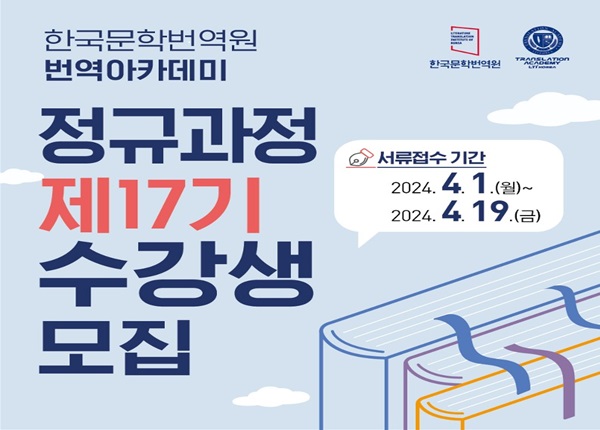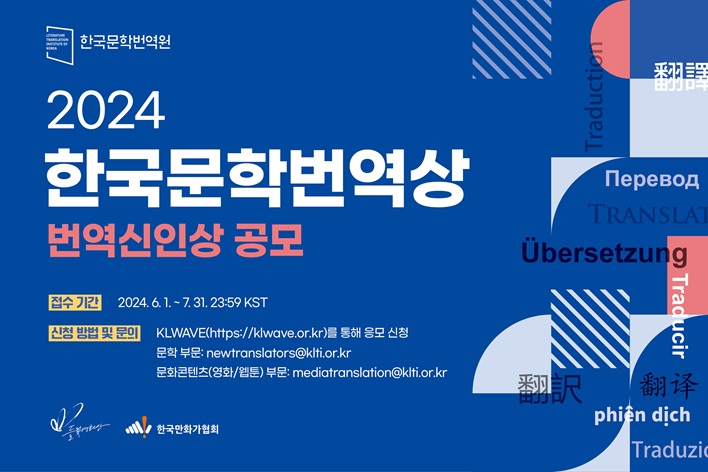지원작품 소개
원하는 서비스를 빠르게
사용자 맞춤서비스
한국문학 해외진출 활성화 플랫폼
- 한국문학 디지털도서관
- 계간지 KLN
- 번역아카데미
- 서울국제작가축제
- 디아스포라 웹진 《너머》
사용자 맞춤 서비스
- 닫기

한국문학,
세상을 잇다! 미래를 열다!
소통과 평화를
지향하는 한국문학
언어와 민족의 차이를 넘어 문학의 보편적 가치를 추구합니다
세계문학으로서의
한국문학
세계 출판 시장 속 당당한 일원이 되도록
한국문학의 위상과 가능성을 모색합니다

행사안내
한국문학번역원에서 진행하는
주요행사소식을 전해드려요
전체
-
보도자료
24.04.18
-
진행중
채용정보
24.04.05
-
채용정보
24.04.02
-
진행중
채용정보
24.03.25
-
보도자료
24.03.22
-
공지
24.03.22
-
공지
24.03.14
-
공지
24.03.13
공지사항
-
공지
2024 번역아카데미 정규과정 제17기 수강생 모집 온라인 입학설명회 안내
24.03.22
-
공지
24.03.14
-
공지
24.03.13
-
공지
24.03.08
-
공지
24.03.07
-
공지
2024 번역아카데미 연계 문화예술 콘텐츠 번역활동 지원사업 참가사 모집
24.03.04
-
공지
2024 번역아카데미 수료생 인턴십 프로그램 참가사 모집
24.03.04
-
공지
24.02.29
보도자료
-
보도자료
한국문학번역원, 별마당도서관과 협업하여 한국문학 해외 수상작 전시 개최
24.04.18
-
보도자료
한국문학번역원 지원도서 김혜순 날개 환상통, 전미도서비평가협회(NBCC)시 부문 최종 수상
24.03.22
-
보도자료
번역원 지원 한강 작별하지않는다, 에밀 기메 아시아문학상 수상
24.03.04
-
보도자료
24.01.29
-
보도자료
24.01.24
-
보도자료
황석영 『철도원 삼대』 미국 공영라디오 NPR ‘2023 Books We Love’선정
23.12.08
-
보도자료
23.12.06
-
보도자료
2023년 하반기 한국문학 해외수상·입후보 성과_1종 수상
23.11.17
채용정보
-
진행중
채용정보
2024년도 제4차 한국문학번역원 공개채용(정규직 1인, 공무직 3인) 공고
24.04.05
-
채용정보
2024년도 제3차 한국문학번역원 공개채용(기간제 근로자 2인) 공고
24.04.02
-
진행중
채용정보
2024년 제1차 한국문학번역원 번역아카데미 전임의교원 채용 재공고
24.03.25
-
채용정보
2024년 1분기 한국문학번역원 보훈특별고용(건물관리 공무직 1인) 최종합격자 공고
24.03.07
-
채용정보
2024년 1분기 제2차 한국문학번역원 공개채용(기간제 근로자 6인) 최종합격자 공고
24.03.07
-
채용정보
2024년 1분기 제2차 한국문학번역원 공개채용(체험형 청년인턴 10인) 최종합격자 공고
24.02.26
-
채용정보
2024년 제1차 한국문학번역원 번역아카데미 전임의교원 채용 공고
24.02.26
-
채용정보
2024년 1분기 제2차 한국문학번역원 공개채용(기간제 근로자 6인) 서류전형 결과 발표 및 면접전형 안내
24.02.22
SNS로 소통해요
-
Instagram
2024-04-18
-
Instagram
2024-04-18
-
Instagram
2024-04-15
-
Youtube
[Stories on a Plate] Ep.1. Overcoming the Fear of Dining Alone
2024-04-15
-
Youtube
[KLN] The Place Seochon Literary Tour: Seochon Books 서촌 그 책방
2024-04-15
-
Youtube
2024 번역아카데미 정규과정 제17기 수강생 모집 온라인 입학설명회
2024-03-28
-
Youtube
번역아카데미 정규과정 제17기 수강생 모집 온라인 입학설명회
2024-03-27
-
Instagram
2024-04-11
-
Instagram
2024-04-04
-
Instagram
2024-03-27



 이 누리집은 대한민국 공식 전자정부 누리집입니다.
이 누리집은 대한민국 공식 전자정부 누리집입니다. 
 행사안내
행사안내







![[Instagram사진]Springing to Life with Korean&...](/_img/web/kr/main/sns_bg.png)









